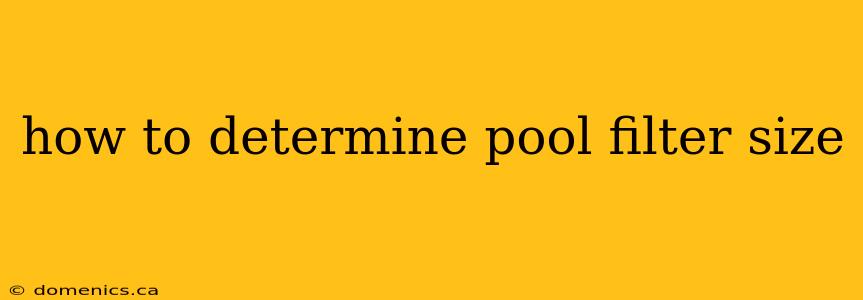Choosing the right pool filter is crucial for maintaining sparkling clean water. A filter that's too small will struggle to keep up, leading to cloudy water and potential health problems. Conversely, an oversized filter might be unnecessarily expensive. This guide will walk you through how to determine the correct pool filter size for your needs. Understanding your pool's specifics is key to selecting the perfect filter.
Understanding Pool Filter Types and Sizes
Before diving into calculations, let's clarify the types of pool filters and how size is measured. Pool filters are generally categorized into three main types:
-
Sand Filters: These are the most common type, using sand as the filtering medium. Size is determined by the diameter of the tank (often in inches) and the gallons per minute (GPM) it can process.
-
Cartridge Filters: These use pleated filter cartridges. Size is typically described by the cartridge's surface area (in square feet) and GPM capacity.
-
Diatomaceous Earth (DE) Filters: These use DE powder as the filtering medium. Similar to sand filters, size is based on the tank's diameter and GPM.
Filter size isn't just about the physical dimensions; it's mainly about the flow rate (GPM) the filter can handle efficiently.
Calculating Your Pool's Filtration Needs
The most accurate way to determine the right pool filter size is by calculating your pool's turnover rate. This refers to how long it takes for the filter to completely circulate the entire pool volume. The ideal turnover rate is generally between 6-8 hours.
Here's how to calculate your pool's filtration needs:
-
Determine your pool's volume: This can be done through online calculators readily available if you input your pool's dimensions (length, width, depth). Many pool supply stores also provide this service. Alternatively, you can find many online pool volume calculators simply by searching "pool volume calculator". Accurate measurement is critical for this step.
-
Calculate the required GPM: Once you know your pool's volume (in gallons), divide it by the desired turnover time (in hours). Then multiply by 60 to get GPM (gallons per minute).
- Example: A 20,000-gallon pool with a desired 6-hour turnover rate requires 20,000 gallons / 6 hours * (1 hour / 60 minutes) = 56 GPM.
-
Choose a filter with a suitable GPM rating: Select a filter with a GPM rating that is equal to or slightly higher than the calculated GPM. A slightly higher GPM will allow for better filtration and cope with increased demand on hot days or when multiple jets are in use.
Additional Factors to Consider
Beyond GPM, other factors influence filter size selection:
-
Pool type: In-ground pools generally require larger filters than above-ground pools.
-
Pool usage: Heavily used pools might benefit from a filter with a slightly higher GPM rating than the calculated minimum. Consider things like how frequently the pool is used. Higher frequency will require a higher capacity filter.
-
Filter media: Different filter media (sand, cartridge, DE) have varying filtration efficiencies. Consider researching the pros and cons of each. Different media will impact the required cleaning frequency and the filter's long term lifespan.
-
Pump horsepower: Ensure your pump is powerful enough to support the chosen filter's GPM. The pump needs to be able to push enough water to keep things running smoothly. It may be necessary to upgrade your pump to take advantage of a more powerful filter.
Frequently Asked Questions (FAQ)
Q: What happens if I choose a filter that's too small?
A: A filter that's too small will struggle to adequately filter your pool's water, resulting in cloudy water, algae growth, and potential health risks. The pool will not be clean and may suffer other issues like staining.
Q: What happens if I choose a filter that's too large?
A: While not harmful, an oversized filter is unnecessary and more expensive than needed. It may also increase energy costs as the pump might work harder than necessary to push water through the filter.
Q: How often should I clean my pool filter?
A: Cleaning frequency depends on the filter type, pool usage, and other factors. Consult your filter's manual for specific recommendations. Regular maintenance is key to keeping the filter running efficiently.
By carefully following these steps and considering the additional factors, you can confidently choose a pool filter that will keep your pool water clean, clear, and safe for years to come. Remember, investing in the right filter is crucial for both the health of your pool and the enjoyment of your swimmers!
